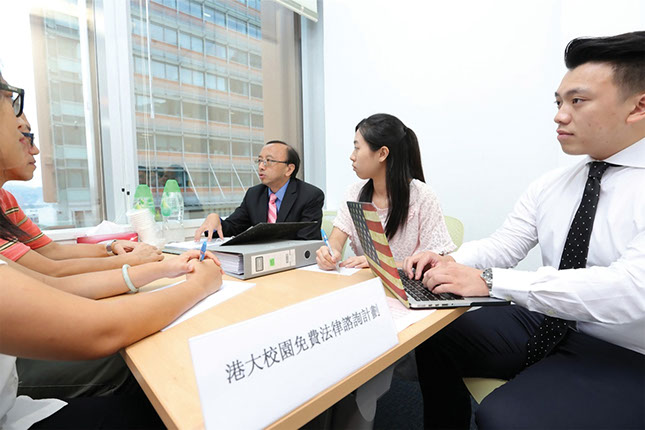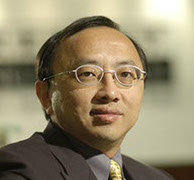
An advice session of the Free Legal Advice Scheme on HKU Campus.
Legal Lifeline
Originally started to give law students practical experience and cultivate their pro bono ethos, the Clinical Legal Education programme has developed in new directions – sparking an innovative relationship between Legal Aid and HKU’s Law Faculty and also becoming a lifeline for people who have been wrongfully convicted.

The original reason for starting the Clinical Legal Education (CLE) programme was to supplement law students’ learning. “Traditionally, Hong Kong has had the British approach to studying law,” explained CLE Director Eric Cheung. “That is, classroom learning followed by an internship. Other countries introduced a clinic approach, but not Hong Kong – partly because it is resource heavy. But our former Dean of Law Professor Johannes Chan initiated the idea, my colleagues and I spent several years planning the programme and then we kick-started it in 2010.”
The main objectives from the student point of view were “to enable them to deal with real clients and handle real cases so they could learn lawyering skills that can’t be taught in a classroom, and to cultivate in them a sense of community service, to show them that being a lawyer is not just about making money – it is about having a heart,” said Mr Cheung.
“The CLE programme’s main service from the community’s viewpoint is to offer free legal advice, so people know where they stand legally and how they might proceed. Because of the resources constraints, the service does not normally go beyond advice, but there are exceptions. Sometimes advice alone is not enough – we have gone beyond and actually represented a client, usually to rectify a miscarriage of justice.”

![]() There is much more widespread awareness about the service now, and this has prompted people in prison to write to us asking for help.
There is much more widespread awareness about the service now, and this has prompted people in prison to write to us asking for help. ![]()
Mr Eric Cheung
Media attention
These cases have garnered a lot of attention in the local media and engendered requests for help from people serving time in prison. “People find out about the service through our website, the alumni network and most recently through the Chinese media in Hong Kong,” he said. “There is much more widespread awareness about the service now, and this has prompted people in prison to write to us asking for help.”
Such has been the publicity that the English-language daily South China Morning Post ran an article about Mr Cheung’s role in leading the programme entitled ‘A Lawyer with an Eye on Injustice’.
One case which received a lot of attention happened last year, when a man wrote to the CLE from Stanley prison. He had been convicted by a jury and sentenced to more than eight years’ jail. He wanted to appeal, but his request for Legal Aid had been turned down. Mr Cheung and a team of CLE students felt the case had merit and mediated to get him Legal Aid.
“We then took it a step further and I took on the case,” said Mr Cheung. Acting for the client, he wrote to the Department of Justice and discovered they hadn’t disclosed some information which would have helped his case. “We got him bail pending an appeal on the basis of non-disclosure of this information. The Department of Justice conceded the error and we won the appeal– he has since been released from jail.”
The success of the CLE has also led to another encouraging development: the Law Faculty has developed a new working relationship with the Legal Aid Department. “Such is the mutual regard now, we no longer need to challenge their refusal decisions through formal appeal channels, and we can now write or talk to them directly about a case. Even when our view is different to theirs, they recognise that our common objective is to promote justice and grant Legal Aid to meritorious applicants. They are happy to listen to our argument and if persuaded they may grant the Legal Aid even though they have previously refused for lack of merits.”
Mr Cheung feels it is beneficial for students to see for themselves that while Hong Kong has a very effective and fair legal system, mistakes can happen and justice can miscarry. “The CLE experiences give them a better idea of what lawyering is really about.”
“Last term, there was the case of a defendant who had pleaded guilty in the Magistrate’s Court. His family came to us because they thought he should reverse his plea. The problem was their lawyer had not sufficiently explained the pros and cons to them and they felt the defendant had been forced to plead guilty.
“We advised them, and later we got a thank you card from them,” said Mr Cheung. “The card said that, while in the end the defendant had not changed his plea, our advice had empowered them to be confident that they were making the best decision on an informed basis.
“This was an important lesson for our students: it showed them that it is not always about winning the case, but about having empathy with the clients who need to feel that someone is listening to them and giving them objective and sound advice.”
Since the CLE began, the Law Faculty has received more than 800 requests for help covering areas of law including civil, criminal, family, probate. The programme also won the Law Faculty Knowledge Exchange Award for 2015.

Clients sent Mr Eric Cheung and his team thank you cards as a token of gratitude and appreciation.
Back

